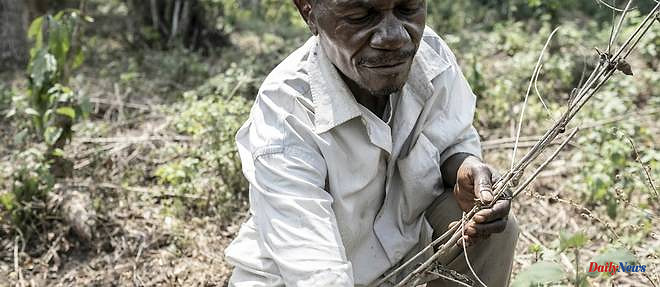"We only live with the trees that are left," says Eugène Omokomi in despair, looking defeated as he gazes at a patch of the Central African forest of Mbata, his "home", decimated by industrial logging and illegal logging.
This 55-year-old aka pygmy has lived in Mbata since childhood, a forest town in the Lobaye region, 110 km south of Bangui, the Central African capital.
In Mbata, nearly 40% of the inhabitants are aka pygmies, a nomadic people traditionally hunter-gatherers and an ostracized minority in this central African country among the poorest in the world.
Installed for centuries in the forest which provided for all their needs (food, clothing, pharmacopoeia...), they have settled in recent decades in towns and villages where cohabitation with other ethnic groups is difficult.
Regularly victims of discrimination, the Akas are relegated to the poorest strata, often in huts made of branches on the edge of villages built in solid.
In 2018, an Encyclopedia of Aka Pygmies (Peeters editions) estimated that 100,000 of them still lived in this dense and humid forest of Central Africa, between the south of the Central African Republic and the north of the two Congos. But their habitat and way of life are threatened by deforestation.
According to Global Forest Watch, the Central African Republic lost 193,000 hectares of primary rainforest between 2001 and 2021, or 21% of its total loss of tree cover.
In Mbata, it is obvious. Since the arrival of the first of the logging companies in the early 1980s, the living conditions of the Akas have deteriorated. They had already been uprooted from the heart of the forest in the 1940s, as part of the sedentarization policy imposed by the colonial power, France.
"The trees that produce fruit, allow wild vegetables to grow or pick caterpillars (essential in the diet of the Akas), have been cut down, we are in danger", deplores Eugène Omokomi.
At the aka camp, in the shade of her palm-leaf hut, 70-year-old Pauline Ndakpema remembers the time when her family lived in the forest. "I easily found wild vegetables like yetoum" (or gnetum), she says before adding: "Today, they are increasingly rare".
Wild yam, tarots and other tubers are "very difficult" to find today. Just like game. "Before, he was prowling around the camp but we don't see any more," laments the septuagenarian.
"Before, I could cultivate my field just behind the house", also explains Ms. Ndakpema, who deplores the impoverishment of the soil and climate change due to deforestation. It happens to her today "to stay five days alone without eating" when her family has to go hunting for several days, always further in the forest.
A few hundred meters from the camp, heaps of planks of wood stand out from the tall grass on the outskirts of a clearing dotted with stumps of trees freshly felled by clandestine loggers.
"It's our only way to live," says one of them who operates on this site with six others. "We only work at night," he says.
"Even to get treatment it's difficult, illegal immigrants also cut down medical trees and we have no money to go to the hospital," complains Paul Mbambali, a farmer.
In the fight against illegal logging, an executive from the Ministry of Water and Forests, on condition of anonymity, deplores a "problem of understaffing and vehicles" to track down illegal immigrants.
The pygmy population "lives only on hunting, fishing, and gathering. Its way of life depends mainly on the forest", explains Lopez Dacko, president of the Alliance for the development of the environment and the culture of the pygmies. aka.
Some are even driven into exile in neighboring Congo or the Democratic Republic of Congo (DRC).
"Now they have to cross the Oubangui River to find a satisfactory dense forest" in the DRC, warns Mr. Dacko, who is worried about the decline in the Aka population in Mbata.
In the heart of his nursery, Irack Mayewokoa, president of the village committee for the protection of natural resources, waters hundreds of cuttings of different tree species, some of which are in danger such as the Sapelli (privileged habitat for caterpillars). Because "it takes a century to grow."
"We have more than 3,000 plants for reforestation", details this 30-year-old, but he is worried: he lacks funding for his project.
06/04/2023 07:58:19 - Mbata (Centrafrique) (AFP) - © 2023 AFP












